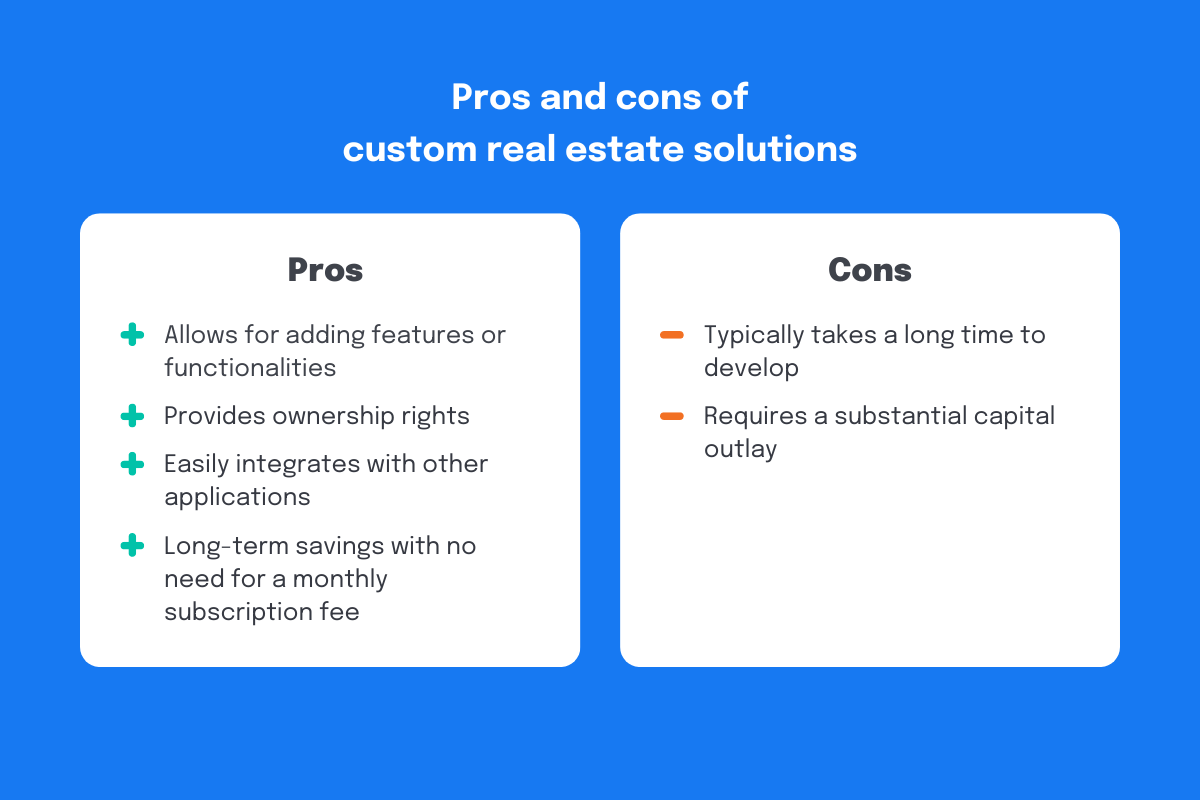Most industries have been embracing technological advancements of late, and the real estate industry has not been an exception. A recent report estimates that the global market in 2021 valued $25,145.1 million and will continue to grow at a CAGR of 15.8% from 2022 to 2030. In an increasingly competitive world, it is vital for real estate companies to move with the times when it comes to real estate management software. For any firm to derive the most out of software development, they must have a full understanding of what it is, how it is done, the costs, and the benefits that are associated with it.
Table of Contents
The most popular types and features of real estate software
The applications of real estate software solutions are vast. Any real estate business needs to evaluate which areas they might need the help of digital solutions to implement these that can make a real difference and optimize business processes. Described below are some of the most popular types of software and their features that real estate companies can incorporate into their operations.
Real estate management software
Managing real estate can be a daunting task. It is particularly true for companies that own multiple real estate properties. Failure to adhere to proper management practices can lead to the company having losses that would have otherwise been avoided.
We know at least three features that make real estate management software worthwhile.
Real-time information
Real estate management software features real-time information. It is critical, considering that events can occur quite fast in real estate. Sometimes, decisions are postponed because realtors will not have access to real-time information at that point during their fieldwork. With web-based real estate management software, businesses can experience the convenience of working from anywhere at any time. It is because data is updated automatically and available online. As a result, employees can access all the required features from an Android or iOS mobile app.
Security
The other pivotal aspect of real estate management software is that it should feature tight security. Like any other business, real estate companies have to be the custodian of their clientele’s data, some of which might be sensitive. In this case, such data includes credit checks, lease agreements, ID information, etc. Usually, real estate management software ensures that there is no need to worry about data breaches as it features encryption technologies.
Data
In this day and age, businesses are increasingly becoming more reliant on big data. However, data analyzed from manual sources are usually unreliable and take so much time that nobody actually does these analyses. Real estate management software allows users to run thorough analyses and make data-driven decisions.
Property management software and apps
Property management software and apps have features that optimize the job of real estate professionals. The most common features for this are highlighted below.
Property inspections
One of the most time-consuming tasks in real estate is property inspections. However, these are vital as they have a bearing on the valuation of properties. The good news is there are property management software and applications that avail useful inspection templates and generate insightful reports while in the field.
Enhanced communication
Property management also requires the seamless flow of information between the tenants and the real estate company. Property management software and apps also feature customer relationship management. They offer a platform for tenants to create their profiles, make payments and make maintenance requests.
Reduced administration
One of the most tedious aspects of property management is administration. Entering information into spreadsheets manually is a task that most real estate employees find time-consuming and prone to errors. Property management software and mobile app give professionals the convenience of having their data automatically updated.
Real estate CRM software solutions
CRM platform is a powerful tool that helps realtors manage, attract, and retain customers, streamline transaction management, and close deals on time. It is an all-in-one customer services solution for real estate companies.
Real estate professionals will find helpful CRM systems like Hubspot, Zillow Premier Agent CRM, AgileCRM, Streak CRM for Real Estate, Apptivo, among many others.There are also distinct real estate transaction management platforms like Paperless Pipeline, which are made to simplify complex processes and keep agents and clients on the same page throughout, ensuring each stage is a breeze.
Multiple listing service software for real estate
It is a platform that real estate brokers use to exchange information concerning properties and appraisals. It enables agents and brokers who are selling properties to connect with those who want to purchase and vice versa. Multiple property listing services make the entire property buying or selling process much easier.
Real Estate Transaction Standard (RETS) integration solutions
RETS also features on the list of the most popular real estate software. It is a powerful technology for simplifying user experience in real estate listings through a multiple listing service. It is displayed in a universal format to ensure that every realtor using the service can have an experience in sync with others on the platform.
Real estate valuation engines
Real estate valuation engines are some of the core aspects of the real estate industry. It is because of the paramount role that property valuation plays in the financing, investment analysis, insurance, and taxation. Real estate valuation engines help real estate companies with evaluations, cash flow analysis, risk analysis, and mortgages. This software helps both agents and clients alike make informed decisions.
IDX integration solutions for real estate
It is paramount for real estate professionals to embrace Internet Data Exchange (IDX) as it plays a major role in lead generation and, ultimately, sales. The IDX is a policy within the National Association of Realtors (NAR) that enables agents to share listing details on the local Multiple Listing Service (MLS). IDX integration solutions provide easy access to the local MLS or a third-party listing service. It is in the best interest of real estate agents to join listing services such as Zillow and Trulia as they help them build much-needed credibility.
How can you benefit from the best real estate software?
If companies are to obtain the best out of real estate software solutions, they need to be aware of the main advantages of the main solutions available on the market. There are several benefits that property owners can derive from real estate software. These are highlighted below.
Interact with clients
Real estate software provides an opportunity for real estate businesses to engage both their current and potential clients. Several real estate software has chatbot features that companies can use to keep in touch with their clients, creating meaningful relationships in the process and saving time for routine conversations.
Offers big data in commercial real estate
The other advantage of embracing real estate software is that they give companies the much-needed big data that enables users to have the latest market insights that are key for decision-making. What’s more, based on this data, the software can make more targeted offers to users.
According to the PropStream review, a national real estate data software, these tools allow realtors, investors lenders and other industry pros to locate, evaluate and market to highly-motivated buyers and sellers, which increases efficiency and helps finding more opportunities.
Higher lead conversion rate
The other benefit of real estate software is that they result in higher lead conversion rates for real estate companies. Some software solutions feature artificial intelligence add-ons that go about doing lead capture online with higher accuracy. Therefore, it is paramount for real estate companies to invest in such software as it drives up the number of paying customers.
Digital marketing campaigns made easy
Some real estate software also offers social media posting services that are focused on lead generation. It works in the way that automatically creates your social media posts and shares the updates as soon as they are created on the RE platform.
Tracks the sales process
The other benefit of real estate software is that it can be used for the entire sale process from the first user’s contact with you. It is key as it helps businesses optimize their sales by identifying problematic areas across the process.
Automation of tasks
As highlighted before, the real estate industry is characterized by numerous repetitive tasks that employees may find tedious. Real estate software offers realtors to automate some tasks, saving the much-need time and money in the process.
Custom real estate software development or off the shelf solution
One of the toughest decisions that real estate companies face is whether to implement customized or off-the-shelf software solutions. Each approach has its pros and cons, which are going to be discussed below. The best course of action would be to assess your business requirements and opt for the approach that is best suited for you.
Custom real estate software
Custom software solutions are those that take into account all aspects of your business activity. It is the perfect choice for companies that require unique features or operate in narrow niches.
Pros of custom RE solution
- It results in long-term savings as there is no need for a monthly subscription fee and other charges.
- There is room to add features or functionalities.
- It can be easily integrated with other applications.
- There is a right of ownership.
Cons of custom RE software
- The system usually takes a long time to develop.
- It requires a huge capital outlay.
Off-the-shelf software solution
Off-the-shelf software solutions offer basic tools that are useful across the entire real estate industry. They avail standard operations and are not tailored for particular industries or markets.
Pros of ready-to-use RE solution
- They allow businesses a free trial before implementing them on a large scale.
- Since they are readily made, they are suitable for fast implementation.
- Customer support is available.
Cons of ready-to-use RE software
- Since the system is not customized, there might be functionality gaps.
- There is a continuous need for a subscription fee.
| Criteria | Custom RE Software | Off-the-Shelf Software |
| Development Time | Long | Fast |
| Features | Tailored to specific needs | Standard, not tailored |
| Integration | Easy | May require additional work |
| Ownership | Right of ownership | No ownership |
| Capital Outlay | High initial cost | Lower initial cost |
| Subscription Fee | No need for monthly fee | Requires a subscription fee |
| Functionality Gaps | None | May have gaps |
| Customer Support | May be limited | Available |
| Free Trial Availability | Not applicable | Available |
| Long-Term Savings | Yes | Not applicable |
Where to find the best ready-to-use real estate software solutions
Companies can rely on software review websites to find the best ready-made real estate solutions. For example, on G2, real estate software is divided into several categories, such as “Brokerage Management Software”, “Lease Administration Software”, and “Integrated Workplace Management Systems (IWMS)”.
Companies can also read reviews of top real estate CRM tools on Forbes and HubSpot.
Custom real estate software development step-by-step guide
When a company chooses a custom solution for its next real estate software, the development process should include the following steps:
- Conducting in-depth market research.
- Brainstorming ideas to find out what makes your software different from the competition.
- Conducting business analysis to find the company’s growth points.
- Designing the real estate software project structure and its final prototype.
- Writing technical documentation.
- Moving to the software development phase.
- Performing QA testing.
- Releasing the software.
Mainstream technologies used in the real estate business
People will find that high-end technology that has been developed over the years has also been found useful in real estate development. These are described below.
Artificial intelligence and machine learning
Artificial intelligence and machine learning have had widespread applications in the real estate industry. These two have played pivotal roles in driving personalization, for instance, in a mobile app that provides data delivery to individuals. Artificial intelligence and machine learning algorithms have also been used for their predictive abilities of future real estate metrics with up to 90% accuracy.
As the real estate industry continuously implements such technologies as AI and machine learning, it is useful to know the cost of hiring professionals who can help in implementing these technologies into the business. It is also worth saying that the cost of hiring a machine learning specialist can vary depending on the experience level, location, and amount of knowledge the engineer has.
Understanding the average salary can give you a starting point for budgeting and deciding on which candidate is worth hiring. To help you out, we have gathered rates of machine learning engineers across the globe:
| Country | Average Junior Machine learning engineer salary, $ | Average Middle Machine learning engineer salary, $ | Average Senior Machine learning engineer salary, $ |
| The US | $116,000 | $137,000 | $164,000 |
| The UK | $64,000 | $111,000 | $125,000 |
| Mexico | $34,000 | $54,000 | $81,000 |
| Brazil | $29,000 | $63,000 | $79,000 |
| Poland | $28,000 | $57,000 | $67,000 |
| Ukraine | $16,000 | $41,000 | $54,000 |
| China | $55,000 | $62,000 | $118,000 |
| India | $12,000 | $17,000 | $31,000 |
| South Africa | $38,000 | $56,000 | $88,000 |
| Egypt | $6,000 | $12,000 | $21,000 |
Source: Glassdoor, Indeed.com
Augmented and virtual reality
Both augmented and virtual reality solutions have enabled prospective clients to take virtual tours of properties before making a final choice. It has eliminated the time, energy, and expenses associated with visiting multiple properties, some of which can be removed from the buyer’s property base of potential purchases via virtual viewing.
To hire, for example, a virtual reality developer, it is good to understand the average salaries for these specialists. It is well-known that the highest salaries are in the US, Canada, Australia, and Western Europe. Although there are many other countries that have a vast talent pool of highly experienced engineers. So, here we have gathered the average salaries of virtual reality developers from different countries and grouped them by the level of experience: junior, middle, and senior.
| Country | Average Junior virtual reality developer salary, $ | Average Middle virtual reality developer salary, $ | Average Senior virtual reality developer salary, $ |
| The US | $88,000 | $93,000 | $154,000 |
| The UK | $54,000 | $62,000 | $77,000 |
| Mexico | $28,000 | $47,000 | $71,000 |
| Brazil | $34,000 | $68,000 | $83,000 |
| Poland | $27,000 | $52,000 | $67,000 |
| Ukraine | $18,000 | $35,000 | $51,000 |
| China | $51,000 | $67,000 | $91,000 |
| India | $5,000 | $8,000 | $12,000 |
| South Africa | $31,000 | $49,000 | $78,000 |
| Egypt | $13,000 | $23,000 | $35,000 |
Source: Glassdoor, Indeed.com
Internet of Things
IoT features is amongst the technologies that have infiltrated the real estate market. Technology has been used to make real estate spaces smart and energy-efficient. When planning a budget for implementing IoT technology, it is important to consider not only the needed tech stack (JavaScript, React, C/C++, Python, etc.) but also the salaries of developers involved in the project. So, let’s take a look at the average IoT developer salaries across the world:
| Country | Average Junior IoT developer salary, $ | Average Middle IoT developer salary, $ | Average Senior IoT developer salary, $ |
| The US | $93,000 | $109,000 | $142,000 |
| The UK | $48,000 | $60,000 | $74,000 |
| Mexico | $22,000 | $45,000 | $67,000 |
| Brazil | $35,000 | $52,000 | $68,000 |
| Poland | $25,000 | $47,000 | $61,000 |
| Ukraine | $17,000 | $32,000 | $52,000 |
| China | $52,000 | $65,000 | $86,000 |
| India | $7,000 | $10,000 | $14,000 |
| South Africa | $33,000 | $58,000 | $81,000 |
| Egypt | $6,000 | $10,000 | $11,000 |
Source: Glassdoor, Indeed.com
Data Science
Nowadays, businesses are increasingly data-driven. Big data collected on companies’ digital platforms have become a source of vital market insights. Players in the real estate industry have also used data science and analytics to optimize operations and make decisions that have long-term bearing on their businesses.
Hiring a data scientist can be a crucial decision for businesses. However, nowadays, businesses have a lot more flexibility in terms of hiring data scientists. Today, they have a vast pool of professionals from around the world at all possible rates. So, check out the rates of data scientists from different countries in the table below.
| Country | Average Junior data scientist salary, $ | Average Middle data scientist salary, $ | Average Senior data scientist salary, $ |
| The US | $112,000 | $151,000 | $210,000 |
| The UK | $59,000 | $83,000 | $92,000 |
| Mexico | $53,000 | $87,000 | $130,000 |
| Brazil | $38,000 | $66,000 | $108,000 |
| Poland | $39,000 | $58,000 | $98,000 |
| Ukraine | $14,000 | $30,000 | $76,000 |
| China | $49,000 | $81,000 | $126,000 |
| India | $12,000 | $20,000 | $45,000 |
| South Africa | $25,000 | $43,000 | $63,000 |
| Egypt | $8,000 | $16,000 | $31,000 |
Source: Glassdoor, Indeed.com
Chatbot
Chatbots have become a popular feature on most realtor’s platforms. These have emerged to be a handy tool in keeping potential customers engaged and informed.
When it comes to hiring chatbot developers, it’s important to consider their location, experience, and knowledge. Another thing to mention is the average annual salaries in different parts of the world. Here’s what you need to know.
| Country | Average Junior data scientist salary, $ | Average Middle data scientist salary, $ | Average Senior data scientist salary, $ |
| The US | $85,000 | $96,000 | $105,000 |
| The UK | $54,000 | $62,000 | $77,000 |
| Mexico | $19,000 | $26,000 | $65,000 |
| Brazil | $10,000 | $38,000 | $51,000 |
| Poland | $15,000 | $41,000 | $63,000 |
| Ukraine | $14,000 | $35,000 | $48,000 |
| China | $28,000 | $58,000 | $90,000 |
| India | $9,000 | $15,000 | $27,000 |
| South Africa | $24,000 | $40,000 | $58,000 |
| Egypt | $7,000 | $13,000 | $25,000 |
Source: Glassdoor, Indeed.com
Location-based service
Real estate agents are increasingly adopting location-based marketing. This tool has been found to result in higher conversation rates relative to its untargeted approach.
Blockchain and smart contracts
Blockchain is also amongst some of the technologies that are altering the real estate space. This technology is being used to secure crucial real estate documents such as title deeds and contracts due to its encryption abilities.
How much does it cost to build a real estate website or software?
Several aspects affect the pricing of a real estate website or software. These include the problem the tool is supposed to solve, workflows, project length, and size. The total cost is a combination of these aspects and can be as low as $20,000 to as high as $100,000.
Wrap up
The real estate market has not been an exception to the technological tools that have taken center stage in most sectors. These have offered several benefits such as real-time information, better customer care, increased leads, and future market insights. Both real estate professionals and clients alike are increasingly becoming more reliant on artificial intelligence and machine learning; augmented and virtual reality; data science, IoT, and blockchain technologies for their daily engagements. There is absolutely no reason to wait. If you are in real estate, the time to adopt these high-end technologies is now.








